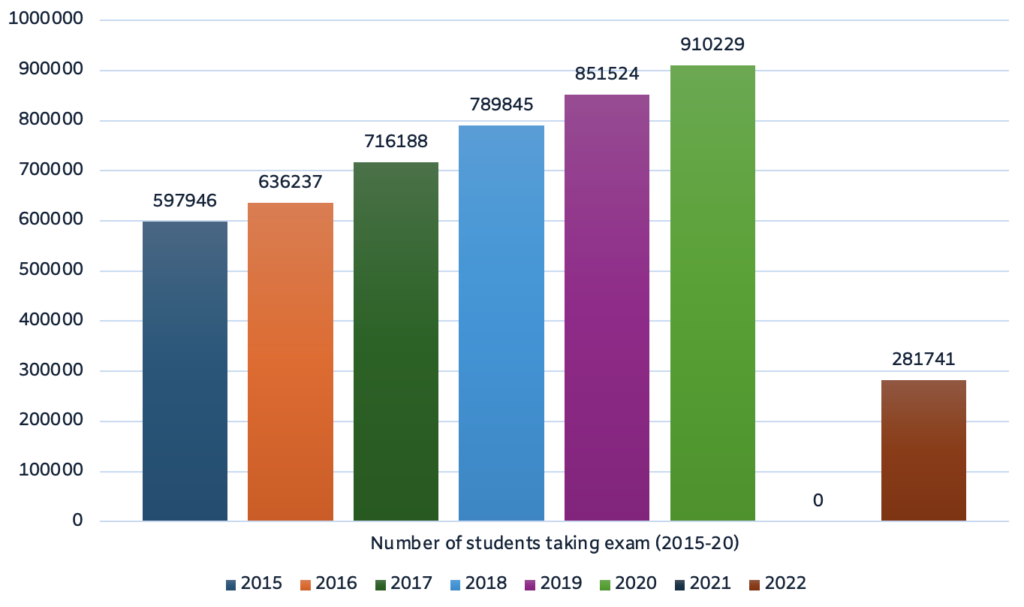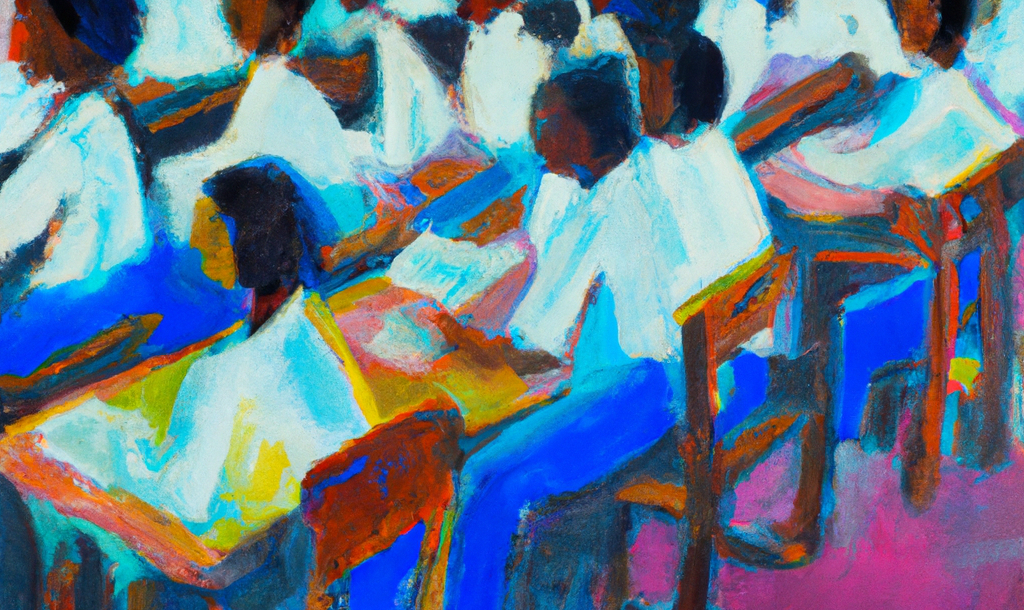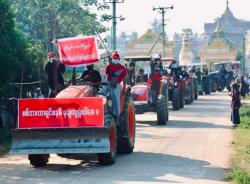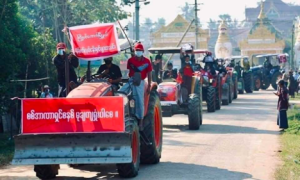Myanmar has two national-level matriculation examinations now: one administered by the Ministry of Education under the State Administration Council (SAC) military junta, the other conducted by the Ministry of Education, National Unity Government (MOE, NUG), a parallel government constituted on April 17, 2021, in the wake of the February 2021 military coup.
The matriculation examination is the gateway for high school students to continue their studies at one of the more than 170 universities in Myanmar. The students take the exam once they finish their Grade 11, the final grade of high school. It is usually conducted once per year in March. As it is the only criterion for university admission in Myanmar, parents and students invest much of their resources in matriculation examinations for future career perspectives.
The matriculation examination’s history can be traced back to the military coup of 1962. The coup led the country into state socialism, in which, the education policy was envisioned in a way that granted superior status to science subjects. To support this policy, two critical practices were adopted. Firstly, the 1964 University Administration Law was enacted, in which all the universities and higher education institutions were administered by a national level body, and the autonomy of universities in recruiting students was restricted. Secondly, the results of the matriculation examination were employed as a single criterion to allocate students to university or specialisation so that those who earn higher marks could be allocated into subjects like sciences, medicine, maths, and engineering, in accordance with an education policy that privileged sciences.
Furthermore, according to the 1973 University Administration Act and the University Admission Application Guidelines published annually, the university itself has no authority over the admission process and decision-making. The Department of Higher Education under the Ministry of Education assigns students to potential universities and specialisations based on the aggregated marks of their matriculation examination. As a result, it is the responsibility of national-level educational administration to manage the matriculation examination and, so educational authorities pay much attention to the security of the exam. Therefore, the events, statistics, news, rumours and corruption around the examination usually capture the attention of the general public.
Matriculation examination in the aftermath of the coup
Matriculation examinations could not be conducted by SAC’s education bureaucracy in 2021 due to nationwide demonstrations against the coup, the participation of civil servants and public service providers in the civil disobedience movement, and school closures caused by COVID-19 outbreaks.
Although campus activism and politicising education are prevalent in the history of Myanmar, it is the first time in history that the matriculation examination has been politicised to such an extent. After the failure of two attempts to reopen schools in June and November of 2021, the military’s education ministry started to politicise the matriculation examination. It released its call for application to the 2022 examination on 11 November 2021.
New analysis shows how a surge of online resistance in the countryside faded amid fear and self-censorship.
Farmers, Facebook and Myanmar’s coup
Recognition of the problem
The announcement of the military’s call for application to matriculation examinations and the popularity of debate around it became the focusing event for the NUG. As a countermove, its education ministry released a statement on 15 November 2021, four days after SAC’s call for exam applications, saying that all the education activities, grade promotions and matriculation examinations conducted by MOE of SAC are illegitimate as SAC itself has not been recognised by the international community—nor, most importantly, by the people of Myanmar.
Statistics around the matriculation examination conducted by SAC also became a pressing indicator and encouraged the decision-makers in the NUG to pay much political attention to it. In the 2022 matriculation examination administered by the junta, only 281,741 students out of 312,420 registered students took the examination. This represents only around 30% of the before-coup population of more than 900,000 exam takers (see Figure 1 below). Such statistics could be translated that the rest 70% of the high school students’ population are joining the CDM and not cooperating with the military administration.
Figure 1: Number of students taking matriculation examination, 2015–2022

(Source: author’s calculation based on Ministry of Education [SAC] release)
The favourable political situation
When it comes to politicising the matriculation examination, it is the national mood that most pressed the NUG administration to conduct a rival matriculation examination. The national mood of post-coup Myanmar regarding the military-conducted matriculation examination is reflected in the country-wide civil disobedience movement (CDM). under which civil servants refused to work under the military and people were not cooperating with its administration.
Although the campaign was first kicked off by healthcare workers, teachers and administrative staff in the education sector shared the majority of the CDM population. Initially, it is estimated that more than 300,000 education workers participated in CDM. As of April 2021, according to ISP Myanmar, the military has released that more than 27% of primary and secondary education staff and 56% of tertiary education staff are absent at their workplace—meaning that they have joined the CDM.
Several universities declared themselves as CDM universities and constituted ‘Interim University Councils’ to manage the affairs of the university themselves. Primary and secondary education staff, constituting township education boards, refusing to follow military orders. As of Oct 2021, 279 township education boards (out of 330 townships across the country) and 235 university councils (out of 297 universities across the country) are affiliated with the NUG.
Meanwhile, a majority of the student population in primary, secondary and tertiary education refused to attend the schools reopened by the military. Only a quarter of 12 million primary and secondary students and very few university students enrolled for the new school year in June 2021, either due to showing their solidarity with CDM or inadequate COVID-19 prevention measures prepared by military administration at school.
This country-wide CDM caused the NUG not only to provide education services but also to pay good attention to the military’s education policies and to counterattack if necessary. This is because such an action could fuel the momentum of CDM and accumulate domestic support for the NUG. By the time the military’s education ministry announced the matriculation examination as aforementioned, the NUG were alarmed to focus on it and to conduct their own nationally standardised examination.
In addition to the national mood, the support of the interest groups encourages the NUG to prioritise conducting a rival matriculation examination. Some interim university councils which are affiliated with MOE, NUG, have publicly announced that the university would not recognise the matriculation examination conducted by SAC in 2022 and would not allow enrolling those students taking the 2022 exam.
For instance, more than 20 councils of technological universities and students’ unions released statements unrecognizing the examinations under SAC and have urged the parents and students not to sit for the examination as a means to against the military regime and keep continue the country-wide civil disobedience movement. Such support from its affiliated university councils and student unions pressed the NUG to initiate a rival examination to counter the military administration. Moreover, it is likely that the cabinet of NUG assumed that conducting such matriculation examination would serve its own political interests, fuelling the continued nationwide CDM and thereafter increasing its legitimacy domestically.
A Policy Window
Policy entrepreneurs — people who desire to invest his/her resources in return for the future policy they favour, are significant in the Myanmar examination case. They are invisible participants— mostly groups of scholars, educationists and experts in assessment and examination. They boycotted the military’s educational activities, anonymously affiliated with the NUG’s education ministry, and were involved in its different education activities.
They have put their resources such as time, knowledge and skills into different NUG education activities as a way to show their opposition to the military coup. Those experts in assessment and examination helped draft an assessment policy for the NUG’s home-based education program. Their efforts have been a significant factor in pushing the NUG to consider conducting its own matriculation examination. Before the military planned to conduct the matriculation examination, they sought to advocate that the NUG conduct or at least consider conducting the matriculation examination. For them, it is believed that the NUG education ministry needed to be proactive in considering conducting a rival matriculation examination as the military would take political advantages from the exam. When the military decided to conduct the 2022 matriculation examination in November 2021, it was a politically favourable time or a policy window for those assessment academics to push their pet proposal of developing a NUG matriculation examination.
Moreover, my analysis of the policy documents also suggests that the assessment experts developed the NUG’s matriculation examination policy proposal to pertain to some criteria such as technical feasibility, congruence with the values of community members and anticipation of future constraints such as budget and receptivity of the public and politicians amidst political instabilities. First, the assessment policy came along with two-hour-long multiple-choice questions which are efficient in marking, and relevant for interim resistance governments like MOE, NUG to administer well. In the past, the matriculation examination had several essay-type questions which required thousands of teachers to gather in a particular university for several days to mark and compile data. This could not be the case for the NUG’s examination because it is based on multiple-choice items which could be easily marked.
Furthermore, by considering the NUG’s limited on-ground education services and the proximity of the students to conflict, the policy proposed both internet-based and paper-based assessments at on-ground assessment centres. It allows students to take the examination at multiple examination periods within a year—in 2023, in February and August—at their convenience.
In addition, a big shift from military matriculation is that it guaranteed to assess the higher-order thinking such as application, analytical thinking and creative problem-solving skills of Bloom’s Taxonomy with a competency-based grading system. This is in congruence with the values of community members, as the education community in Myanmar has been long for a paradigm shift in assessment in Myanmar from memorisation-based to competency-based assessment during the country’s education reform period during 2011–2021. In an interview, one community mathematics teacher mentioned that he is receptive to the question type of the NUG’s exam, especially for the mathematics subjects, because, for example, in Geometry, the exam does not require students to jog down the name of a theorem exactly as in the before-coup exam, which renders memorisation instead of logical reasoning.
Most importantly, it is also deemed that the matriculation examination proposal anticipated the future constraints of public acceptability. In an interview with a person from a township education board, constituted in the post-coup period, he mentioned that the people who are working on on-ground education in the conflict-affected areas accepted that they need a matriculation exam which is not administered by SAC.
It is important to note here that some of the policy entrepreneurs around the NUG ministry of education were also involved in township education boards, and, for them, it means that a rivalry examination would fill this gap and could potentially increase their domestic legitimacy. Hence, the policy solution attached to the requirement of examination for more than 70% of the high school student population who boycotted the SAC’s exam and countering SAC’s exam finally led to opening a policy window for the NUG to conduct its own matriculation examination.
The impact on students
Ultimately, students are those most impacted by how Myanmar’s education system has been affected by the 2021 coup. The military killed and detained teachers and students, and used schools and university campuses as bases for military operations. It then extended its manipulation to matriculation examination through politicisation. To counter such a problem, when the political climate is favourable and policy solutions are available, the NUG’s education ministry has initiated matriculation examinations as part of its political battles with the SAC.
Both the SAC and NUG exams have good and weak points. Firstly, taking SAC’s exam is incompatible with society’s values and the CDM. Parents across Myanmar boycotted the military-led schooling and did not let their children take the matriculation examination to show their solidarity with the country-wide CDM or because they do not believe in the quality of teachers under the military education system. On the other hand, taking the NUG’s exam might lead to security concerns and to situations where future education pathways with the future recognition of NUG-issued credentials being uncertain As a result, the students face ambiguity about how to proceed with their educational pathways. (At the time of writing, the NUG’s education ministry has conducted their version of the matriculation examination twice, and 16 universities affiliated with them recently welcomed the new students.)
Such a situation also exacerbates the disparity among the students. Some students, who could afford it, decided to prepare for internationally recognised certificates such as GED and IGCSE to avoid the dilemma. Meanwhile, others drop out of school, take up arms, or flee due to conflict in their areas. As a consequence, the students lose their hopes and future, leading to the deterioration of human capital and the future development of Myanmar.
 Facebook
Facebook  Twitter
Twitter  Soundcloud
Soundcloud  Youtube
Youtube  Rss
Rss 



